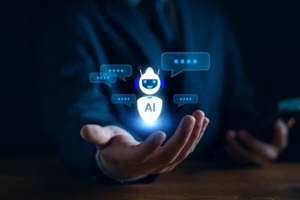Generative AI is an advanced technology capable of creating content from scratch, such as words, images, and more. It has already had a profound effect on various industries, changing how businesses approach creative work, customer interactions, and data-driven decision-making.
However, diving into AI without preparation can lead to shortcomings, challenges, and other problems. Assessing your organization’s readiness helps you make informed decisions, properly allocate resources, and maximize the value generative AI can bring to your operations.
Comprehending Generative AI Capabilities and Requirements
Generative AI are artificial intelligence systems that make new content based on data used to train the model. It goes beyond analyzing and predicting—it generates original outputs altogether.

These capabilities open up endless possibilities, from drafting marketing copy to designing exclusive visuals or expanding data for deeper analysis. Having the right technical setup is essential to implementing generative AI effectively.
You need powerful hardware, particularly GPUs, which are designed to handle the heavy computational load involved in training AI models. GPUs allow faster processing and help your system manage the complex tasks that generative AI requires.
In addition, you’ll need specialized software tools such as TensorFlow or PyTorch, popular frameworks for building, training, and fine-tuning AI models. These tools provide the building blocks for developing custom solutions that meet your exact needs.
Cloud-based options also play an important role in supporting generative AI by offering scalable storage and computing power. Cloud platforms enable you to store large volumes of data securely and expand your processing capabilities as needed, allowing your generative AI projects to grow alongside your business.
Assessing Organizational Needs
To effectively use generative AI, start by identifying specific areas within your business that could benefit from its capabilities. Try to look at repetitive tasks or processes where creativity is needed but takes up a lot of time.
For example, content generation for marketing, drafting reports, or automating customer service responses are prime candidates for generative AI. Identify areas where enhancing efficiency or output quality would make a big impact—whether it’s personalizing customer interactions or speeding up data-driven content creation. Finding the right use cases is essential to maximizing AI’s value.
Aligning generative AI initiatives with your business objectives is equally important during this process, so try to actively consider your organization’s current strategic goals and how AI can help you achieve them.
If your focus is on improving customer experience, generative AI can play a significant role in creating more personalized communication. If operational efficiency is your goal, automating routine content or data analysis tasks can free your team to focus on strategic priorities.
Making sure that your AI projects directly contribute to your primary business goals helps you leverage technology in a way that drives tangible results and supports growth rather than adding complexity without clear benefits.
Evaluating Data Availability and Quality
Evaluating data availability and quality is an important step in preparing for generative AI models. You should conduct a data audit to determine exactly what assets and information your business currently holds.
Make sure to assess the quality of your data carefully—check for completeness, accuracy, and consistency. High-quality data is essential to building effective AI models, as poor data can ultimately lead to flawed outputs.
From there, you should determine the exact relevance of the data at hand to your AI project—confirm that the data relates to the task and project at hand. Finally, evaluate its availability—confirm you have enough data to train the AI and that it’s accessible in the correct formats.
In addition to auditing your data, data governance practices play a significant role in your AI readiness. Establish policies for maintaining data integrity, privacy, and security to protect both your company and customers.
You must address how the data is stored, accessed, and shared, making sure that these processes comply with essential regulations. Well-defined data governance assures that the information used for AI training remains reliable and secure.
Skillset and Team Readiness

Try to identify who has experience working with AI frameworks, who understands data handling best practices, and who is comfortable interpreting AI-driven insights. Knowing where your team stands helps you determine whether you have the internal capability to move forward or if there are gaps that need filling.
Addressing skill gaps among team members involves several strategies. You can begin by investing in internal training programs to build up your existing team’s expertise.
Online courses, workshops, and AI and data science certifications can provide your team members with the foundational knowledge they need. Offering hands-on projects or collaborative learning sessions can reinforce these skills in a practical setting, helping them become more confident using AI tools.
In some cases, internal training may not be enough. Hiring new talent can bring in the specialized skills required to accelerate your AI initiatives, so consider recruiting experienced AI developers, data scientists, or machine learning engineers to strengthen your team.
If full-time hires aren’t feasible, partnering with an AI consultancy or using staff augmentation services can help you access the expertise you need without long-term commitments. Balancing internal growth and new talent acquisition can help make sure that your team is well-prepared to take advantage of generative AI, supporting a smooth transition into AI-driven processes.
Legal and Ethical Considerations
Addressing the ethical aspects of generative AI is essential to building trust and fairness in your projects. That’s why your team should learn about and understand the potential for bias in AI models. The data used for training can unintentionally introduce biases, potentially leading to skewed results that may unfairly impact certain users.
To prevent this, prioritize diversity in your data sets and regularly audit your models for potential bias. Transparency is another important consideration—users should understand how AI decisions are made and what factors are involved. Providing clear explanations helps build trust and makes AI-driven decisions more acceptable to your partners.
Legal compliance is another important aspect of AI readiness. Generative AI must adhere to data privacy laws, such as GDPR, which protect user information and define how data should be handled. Reviewing these regulations helps you avoid legal pitfalls and maintain ethical standards in your AI practices.
Consider industry-specific guidelines that may affect how you deploy AI within your organization. Different sectors may have their distinct compliance requirements that need addressing.
Staying informed about these regulations helps protect your organization from legal risks and establishes a responsible foundation for AI implementation that respects both legal and ethical boundaries.
Technological Scalability and Integration
Take a close look at your existing infrastructure to determine if it can expand to handle the increased demands of generative AI. This process might involve assessing cloud options, additional hardware, or more flexible solutions that can grow alongside your AI projects.
Scalable infrastructure allows you to keep pace with the needs of generative AI as it evolves and your business grows. Integration capabilities are just as important for a smooth AI implementation. Your current systems must be capable of working seamlessly with new AI technologies.
Take the time to evaluate how well your existing platforms, databases, and software tools will connect with AI components. Look for any compatibility issues or gaps in functionality that could hinder integration. Adjustments, such as updating APIs or investing in middleware solutions, may be necessary to help bridge these gaps.
Successful integration means AI tools work harmoniously with your established processes, minimizing disruptions and helping you get the most out of your AI investments without overhauling your entire tech stack.
Pilot Testing and Feasibility Studies
Creating prototypes or pilot projects helps validate your generative AI use cases before fully committing resources. You want to start small with a limited-scope prototype to test how well AI performs in your specific environment.

Defining clear evaluation metrics is essential when measuring the success of your pilot projects. Look at both performance metrics—such as accuracy, speed, and reliability—and the broader business impact. Metrics such as cost savings, increased productivity, and user satisfaction help provide a more complete overview of the pilot’s effectiveness.
Preparing Your Business for Generative AI
Assessing your organization’s generative AI readiness involves multiple important steps, from comprehending technical requirements to aligning AI projects with your business goals. If you want to learn more, you can check out articles, whitepapers, and industry-specific guides to deepen your knowledge of generative AI and how it can directly benefit your business.
Need assistance assessing your organization’s current AI readiness? Reach out to our team online or call 301.756.5527 to schedule a consultation. We look forward to discussing your organization’s distinct needs and next steps.






